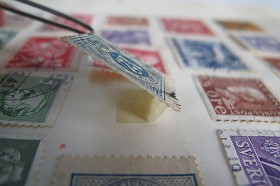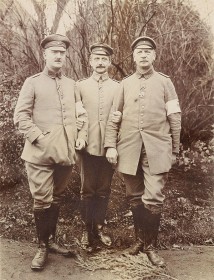
A wall full of questions at the exhibition “The whole truth” © Jewish Museum Berlin, photo: Thomas Valentin Harb
Just over a year ago the Jewish Museum’s special exhibition entitled “The whole truth… everything you always wanted to know about Jews” ended. The only remnants – aside from the animated discussions and empty display cases – were thousands of pink post-it notes, which we kept and read through painstakingly. In the upcoming months we want to respond to some of the questions, comments, and impressions that visitors left behind. Thus to the question above.
Orthodox women do not show their hair in public after their wedding. → continue reading

A stamp with a loose paper hinge © Jewish Museum Berlin. Donated by Kurt W. Roberg, photo: Kirsten Meyer
Kurt Roberg (*1924) made a bequest to the Jewish Museum Berlin this year, which comprised among other things a stamp-album—one of the very few items in Roberg’s possession when he fled Berlin for Lisbon then New York in May 1941. Jewish emigrés were forbidden to take their belongings with them out of Germany so Roberg came to see the album as a symbol of his personal triumph over the National Socialist dictatorship.
It is a simple folder containing → continue reading

Carl Hartog (first from left) with two colleagues, Douai, January 1914 © Jewish Museum Berlin. Donated by Virginia Van Leer Dittrich
Visitors can see an album with photographs of places along the Western front in our cabinet exhibition “The First World War in Jewish Memory” for only another few days. The album is part of the bequest of a Berliner gynecologist Dr. Carl Hartog (1877-1931), having been given to the museum at the end of 2001 by Hartog’s granddaughter Virginia Van Leer Dittrich.
Born the son of a leather manufacturer in 1877 in Goch on the Lower Rhine, Carl Hartog studied medicine in Munich, Bonn, and Würzburg. He subsequently established a practice as an ob-gyn in Berlin but, having already done a half year of military service as a student, he stayed loyal to the military as a working professional. → continue reading


